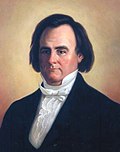| |||||||||||||||||
| |||||||||||||||||
 County results map. Blue denotes counties won by Bramlette and green denotes counties won by Wickliffe. | |||||||||||||||||
| |||||||||||||||||
| Elections in Kentucky |
|---|
 |
The 1863 Kentucky gubernatorial election took place on August 3, 1863, in order to elect the governor of Kentucky. Union Democratic candidate Thomas Elliot Bramlette won his first term as governor [1] against Peace Democratic candidate Charles A. Wickliffe. [2]
Contents
According to the Kentucky Historical Society, the election had considerable Union military interference, [3] since some supporters of Wickliffe were imprisoned for allegedly harboring Confederate sympathies. [4]

